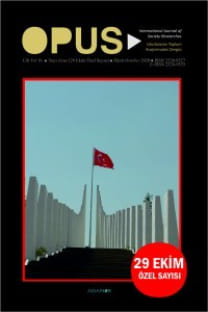Isınmadan Sonra Dinlenme Süresinin Yüzme Performansı Üzerinde Bir Etkisi Var mıdır?
Yüzme, Isınma, Dinlenme Süresi
Does Rest Period After Warming Up Have an Effect on Swimming Performance?
Swimming, Warm-up, Rest Periods,
___
- Agopyan, A., Bozdoğan, F.S., Tekin, D., Küçük Yetkin, M. and Gün Güler C. (2012). Acute effects of static stretching exercises on short distance flutter kicking time in child swimmers. International Journal of Performance Analysis in Sport, 12, 484-497.
- Alberti, G., Annoni, M., Ongaro, L., Scurati, R. and Michielon, G. (2014). Athletic performance decreases in young basketball players after Sitting. International Journal of Sports Science & Coaching, 9, 975-84.
- Ballionis, G., Nepocatych, S., Ellis, C.M., Richardson, M.T., Neggers, Y.H. and Bishop, P. A. (2012). Effects of different types of warm-up on swimming performance, reaction time and dive distance. Journal of Strength and Conditioning Research, 33, 483-498.
- Coskun H. (2017). Genç yetiskinlerde setler arası farklı dinlenme aralıgı surelerinin kuvvet antrenmanında sergilenen tekrar sayısına etkisi. Selcuk Universitesi, Saglık Bilimleri Enstitusu, Konya.
- Eyuboglu, E. (2015). Judo müsabakaları arası optimum dinlenme süresinin saptanması. Ankara Üniversitesi Sağlık Bilimleri Enstitüsü. Ankara.
- Galazoulas, C., Tzimou, A., Karamousalidis, G. and Mougios, V. (2012). Gradual decline in performance and changes in biochemical parameters of basketball players while resting after warm-up. European Journal of Applied Physiology, 112, 27-34.
- Gouvêa, A., Fernandes, I., César, E., Silva, W. and Gomes, P. (2013).The effects of rest intervals on jumping performance: A meta-analysis on postactivation potentiation studies. Journal of Sports Sciences, 31, 459-467
- Gunay, M. and Yuce, A. İ. (2008). The scientific foundations of football training. (Enhanced 3rd edition). Ankara: Gazi Kitapevi, p.223-343
- Hedrick, A. (1992). Physiological responses to warm up. National Strength and Conditioning Journal, 14, 25-27.
- Kuter, M. and Öztürk, F. (1997). Antrenör ve sporcu el kitabı. Bursa: Bağırgan Yayınevi, 34-67.
- Neiva, H. P., Marques, M. C., Barbosa, T. M. and Izquierdo, M et al. (2017). Effects of 10min vs. 20min passive rest after warm-up on 100m freestyle time-trial performance: A randomized crossover study. Journal of Science and Medicine in Sport, 20, 81-86.
- Rahmini, R. (2005). Effect of different rest intervals on the exercise volume completed during squat bouts. Journal of Sports Science and Medicine, 4, 361- 366.
- Ryan, P., Lowery, M.N, Duncan J. and Loenneke, P. (2012). The effects of potentiating stimuli intensity under varying rest periods on vertical jump performance and power. The Journal of Strength and Conditioning Research, 26, 320-325.
- Sahlin, K. (1992). Metabolic factors in fatigue. Sports Med. 13, 99-107.
- Sevim, Y. (2007). Antrenman bilgisi. 7. Baskı. Ankara: Nobel Yayın Dağıtım, p.295-297.
- Smith, C. A. (2004). The warm up procedure: To stretch a brief review. The journal of Orthopaedic and Sports Physical Therapy, 19, 12-17
- Turkmen, D. (2019). Aktif dinlenme sürelerinin tekrarlı maksimal yüzme performanslarına etkisi. Dokuz Eylul Üniversitesi, Saglık Bilimleri Enstitüsü, İzmir.
- West, D. J., Dietzig, B. M., Bracken, R. M. and Cunningham, D. J. et. al. (2013). Influence of post-warm-up recovery time on swim performance in international swimmers. Journal of Science and Medicine in Sport, 16, 172- 176.
- Woods, K., Biskop, P. and Jones, E. (2007). Warm up and stretching in the prevention of muscular injury. Sports Medicine, 37, 1089-1099.
- Zochowski, T., Johnson, E. and Sleivert, G. G. (2007). Effects of varying postwarm- up recovery time on 200m time-trial swim performance. Int J Sports Physiol Perform, 2, 201–211.
- ISSN: 2528-9527
- Yayın Aralığı: 12
- Yayıncı: ADAMOR Toplum Araştırmaları Merkezi
Finansal Performansın Yüzde Yöntemi ile Analizi: Galatasaray A.Ş.’ye Yönelik Bir Uygulama
Mohannad T A GARBIAH, Cüneyd Ebrar LEVENT
Isınmadan Sonra Dinlenme Süresinin Yüzme Performansı Üzerinde Bir Etkisi Var mıdır?
Yücel İNAÇ, Tülin ATAN, Şaban ÜNVER
Türkiye’de Yeniden Evlenme Olgusu: Cinsiyet ve Psikososyal Değişkenler Bağlamında Bir Değerlendirme
Alpaslan ÇOBANOĞLU, Serhat TEK
Üniversite Öğrencilerinin Kentsel Tarım Dersine Yönelik Bakış Açıları
Osmanlı'dan Cumhuriyet'e Vatandaş
Mehmet Melik KAYA, Baykal BİÇER
Okullarda Örgütsel Sinizm ile Örgütsel İkiyüzlülük Arasındaki İlişkinin İncelenmesi
